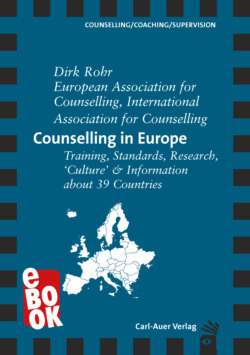Читать книгу Counselling in Europe - Dirk Rohr - Страница 19
На сайте Литреса книга снята с продажи.
3 International Association for Counselling (IAC)2
ОглавлениеThe International Association for Counselling is an International Non-Governmental Organization and has consultative status with several organizations including UNESCO, WHO, ECOSOC, UNICEF, ILO and the Council of Europe.
IAC was founded by Professor Hans Hoxter in 1966 as the International Round Table for the Advancement of counselling. The name of the association was changed to the International Association for Counselling in 1997. Since its inception, the association has offered yearly conferences, consultations and/or digital educational and professional events in countries on all continents of the world. These events have brought together the perspectives of practitioners, educators, researchers and policy makers with the aim of increasing the quality and impact of counselling around the globe. One of the early developments of the association was the creation of the International Journal for the Advancement of counselling.
In an interview in late 2001, Professor Hoxtor predicted the increasing complexity of the issues that counsellors would face in the future, and what would be required of them:
So, the question arises, how from now on how can we go ahead, how can we develop this whole field? The field has developed in a most spectacular way. Today there are people in certainly 120 countries who are committed to counselling as a major factor in emotional, intellectual and spiritual rehabilitation and growth …so that is a great plus, a great achievement but there is so much to be done. The reason in part is that we are engaged in a society which is all the time trying to discover and develop new areas of understanding, new areas of spiritual and intellectual activity in the sense of the integration of the individual or the family in society, but we are today in a society we have to adapt to and live with, which is more challenged, more attacked from within and from without, than we have for the past hundred years. On the one hand I think that counselling offers huge opportunities for helping and supporting and understanding social and personal emotional needs, but it is based, in my opinion, on a major exercise in learning. I think that counsellors in the future will have to develop their learning at a much higher level than we have done in the past (Borgen, 2003, p. 89).
With this perspective in mind, IAC has worked to fulfil scientific and educational and social justice aims to advance the understanding and practice of counselling wherever it is needed, developing or offered in the world, guided by the belief that counselling benefits individuals and groups, and society as a whole. With that broad perspective in view the association has been catalytic in promoting the development of counselling in areas of the world where counselling is less developed, and offers support and consultation to newly developing national and regional counselling associations (Borgen, 2006)
Participation in this association provides a unique opportunity to develop a global appreciation of the way counselling is being deployed to address humanitarian concerns including the promotion of human rights, and the delivery of education, health, and counselling services to individuals, families and groups to address a range of personal, interpersonal, career and social challenges.
